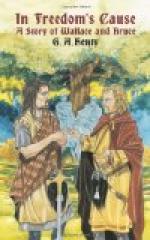At this moment Edward became involved in a quarrel with his own lord superior Phillip, king of France, by whom he was in turned summoned to appear under the pain of contumacy. Edward met this demand by a renunciation of allegiance to Phillip and a declaration of war, and called upon Baliol for aid as his vassal; but Baliol was also a vassal of the French king, and had estates in France liable to seizure. He therefore hesitated. Edward further ordered him to lay an embargo upon all vessels in the ports of Scotland, and required the attendance of many of the Scottish barons in his expedition to France. Finding his orders disobeyed, on the 16th of October Edward issued a writ to the sheriff of Northampton, “to seize all lands, goods, and chattels of John Baliol and other Scots.”
The Scotch held a parliament at Scone. All Englishmen holding office were summarily dismissed. A committee of the estates was appointed to act as guardian of the kingdom, and Baliol himself was deprived of all active power; but an instrument was prepared in his name, reciting the injuries that he and his subjects had sustained at the hands of the English king, and renouncing all further allegiance. Following this up, a league was concluded, offensive and defensive, between the French king and Scotland, represented by the prelates, nobles, and community. Edward Baliol, the king’s son, was contracted to marry the French king’s niece. Phillip bound himself to assist Scotland against any invasion of England, and the Scotch agreed to cross the Border in case Edward invaded France.
In making this alliance the Scots took the only step possible; for they had no choice between fighting England with France as their ally, or fighting France as the subjects of King Edward. The contest which was approaching seemed all but hopeless. The population of England was six times as large as that of Scotland, and Edward could draw from Ireland and Wales great numbers of troops. The English were trained to war by constant fighting in France, Ireland, and Wales; while the Scots had, for a very long period, enjoyed a profound peace, and were for the most part wholly ignorant of warfare.
Edward at once prepared to invade Scotland; in January he seized the lands owned by Comyn in Northumberland and sold them, directing the money to be applied to the raising and maintenance of 1000 men-at-arms and 60,000 foot soldiers, and in February issued a writ for the preparation of a fleet of 100 vessels.
On the 25th of March he crossed the Tweed with 5000 horse and 30,000 foot. The Scotch leaders were, of course, aware of the gathering storm, and, collecting their forces, attempted a diversion by crossing the Border to the west and making a raid into Cumberland. King Edward, however, marched north and besieged Berwick, the richest and most flourishing of the towns of Scotland. With the exception of the castle, it was weakly fortified. The attack was commenced by the fleet, who were, however,




